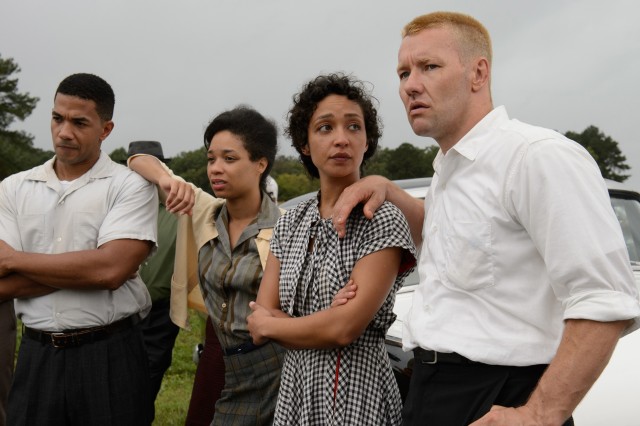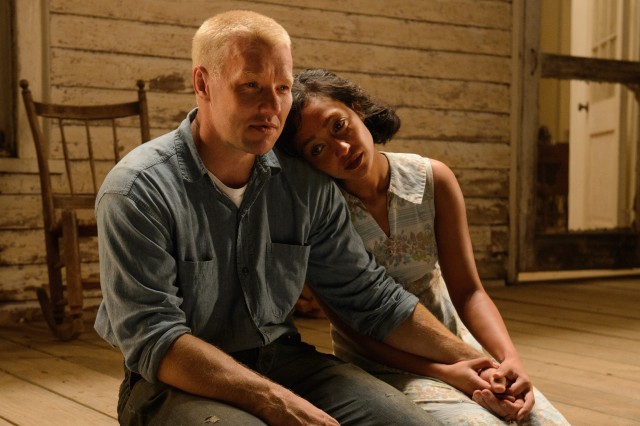Loving Movie Review
 |
Loving
Theatrical Release: November 4, 2016 / Running Time: 123 Minutes / Rating: PG-13 Director: Jeff Nichols / Writers: Jeff Nichols (screenplay); Nancy Buirski (documentary The Loving Story) Cast: Joel Edgerton (Richard Loving), Ruth Negga (Mildred Loving), Marton Csokas (Sheriff Brooks), Nick Kroll (Bernie S. Cohen), Terri Abney (Garnet), Alano Miller (Raymond), Jon Bass (Phil Hirschkop), Christopher Mann (Theoliver), Sharon Blackwood (Lola), Winter Lee Holland (Musiel), Michael Shannon (Grey Villet) |
Having wowed critics and, to a smaller degree, moviegoers with original stories on Mud, Take Shelter, and Midnight Special, writer-director Jeff Nichols changes gears on Loving, a drama based on a true story.
In the late 1950s, Richard Loving (Joel Edgerton), a Virginia bricklayer who works on engines for drag races in his spare time, goes off to Washington, D.C. with his girlfriend Mildred (Ruth Negga) so that the two can be married. State law prohibits Richard, who's white, from marrying Mildred, who's black. But, despite the framed marriage license hanging on their wall, the couple still gets awoken at home in the middle of the night, arrested, and thrown in jail.
Richard gets bailed out, but Mildred does not and though Richard has the money and desire to do so, the square-jawed sheriff (Marton Csokas) sits him down and explains why he considers their actions an affront to God. He's not the only one with strong feelings on the subject. The Lovings agree to plead guilty in exchange for a suspended one-year prison sentence. After Richard and Mildred sneak back home so that Richard's mother, a midwife, can deliver their first child, they are arrested again and sent packing with no chance of return. Upon learning of the case, unseasoned ACLU lawyer Bernie Cohen (Nick Kroll) and a fellow activist attorney (Jon Bass) take up the Lovings' case at no cost to them, working on an appeal to the Virginia court's ruling that could go all the way up to the Supreme Court and alter the U.S. Constitution.
Interracial marriage isn't the scandalous topic it was in parts of this country fifty years ago. But, of course, race and civil rights remain issues. It's a little bit of a stretch to call it timely, but Loving is no soapbox film. Nichols doesn't set out to preach to you about the evils of racism, the beauty of racial harmony, or anything of the sort. He just wants to tell the story of a couple who received flak simply for, well, loving one another even though their skin was different colors.
It is a sweet film with the lightest of touches. It would be easy to simplify, generalize, and paint characters in broad strokes of black and white. But, if you're familiar with Nichols' other films, then you already know that is not his style. This is perhaps his most accessible film yet, its portrayals of Richard and Mildred illustrating their similarities, Both the seasoned Edgerton and the less ubiquitous Negga (perhaps previously best known for a supporting role in the end of World War Z) imbue their characters with depth and personality. Neither part is overwritten, so it's up to the actors to make them real and relatable. They both succeed and could both end up with lead actor Academy Award nominations in response. With this, his fifth film and second mid-sized release of 2016, Nichols seems to be on his way to becoming less of a secret and more of a valued artist. Even if he doesn't pick up directing and original screenplay nominations for this film, it seems likely it's only a matter of time until he's being seriously considered for such accolades. If well-received, the drama could also feature in technical categories; it clearly benefits from first-rate period production design, costuming, and hairstyling.
|
Related Reviews:
DVDizzy.com | DVD and Blu-ray Reviews | New and Upcoming DVD & Blu-ray Schedule | Upcoming Cover Art | Search This Site
DVDizzy.com Top Stories:
Now in Theaters: Arrival • Moonlight • Manchester by the Sea • The Birth of a Nation
Written and Directed by Jeff Nichols: Midnight Special • Take Shelter
Joel Edgerton: Jane Got a Gun • Animal Kingdom • The Great Gatsby
Ruth Negga: World War Z • Jimi: All Is By My Side | Martin Csokas: The Equalizer
Selma • The Help • Perfect Harmony • Glory Road • Remember the Titans
Text copyright 2016 DVDizzy.com. Images copyright 2016 Focus Features, Augusta Films, and Tri-State.
Unauthorized reproduction prohibited.

